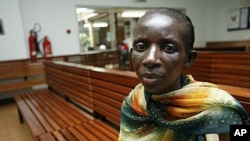Amid a three-week suspension of public and private transport in Uganda due to the coronavirus, some HIV-positive Ugandans have struggled to get hold of needed antiretroviral medications. Noticing a higher risk for HIV patients with compromised immune systems, health worker Simon Bukenya jumped on his bicycle and began making home deliveries, even going long distances to do it.
Simon Peter Bukenya has been living with HIV for 30 years and understands the importance of taking antiretroviral drugs.
A lockdown due to the coronavirus has stranded Ugandans in need of medical attention, including people who are HIV-positive.
Bukenya says on a daily basis, he bicycles more than 80 kilometers to deliver medications to those who need them.
He says he started with three patients, and word of his services spread after he posted a notice on Facebook.
“There’s even a client that called me and sent me a WhatsApp, when she had gotten herpes zoster, and she’s home," said Bukenya. "She’s breastfeeding, she has a two-months-old baby and she’s going through a lot. So, that’s what really motivated me; that’s how I started.”
Bukenya says so far, he has reached 200 patients. He says he doesn’t get paid for his services; he simply wanted to fill a gap for HIV patients in need.
His service is independent of one run by Uganda’s Ministry of Health which recently set up a program to allow community health workers to collect HIV pills for patients.
Dr. Kaggwa Mugaga, the head of HIV for WHO in Uganda, admits the ministry’s service has limits, especially when it comes to supplies of key medicines.
“We have people who volunteer to pick up drugs on behalf of others in the same community where they have openly shared their status," said Mugaga. "This has closed the gap of people missing pills. NMS (National Medical Stores) has been able to deliver what it has, but there are medicines which were at low stock levels, Lopinavir, Ritonavir, for the children.”
The pharmaceutical division revealed that the order for pediatric antiretrovirals is expected to arrive in May.
UNAIDS says about 6 percent of Ugandans are HIV-positive, one of the highest rates in East Africa.
Among these is William Matovu, who was born with HIV and will be 26 in July. He previously did not make his status publicly known, fearing discrimination and the stigma associated with HIV, the virus that causes AIDS.
For him, Bukenya comes in handy.
“I was running out of my medication. I had to call him and he assists me. Due to the ban of public transport in this COVID-19 era, I could not move to my facility," said Matovu. "It’s like 15 kilometers away from my home. When I contacted him, he asked me my details, So, when I gave him my details, he went to my facility and picked up the medication for me and brought it to my doorstep.”
Uganda has so far recorded 74 COVID-19 cases, but no deaths.
The government’s travel restrictions are currently due to expire on May 3.




